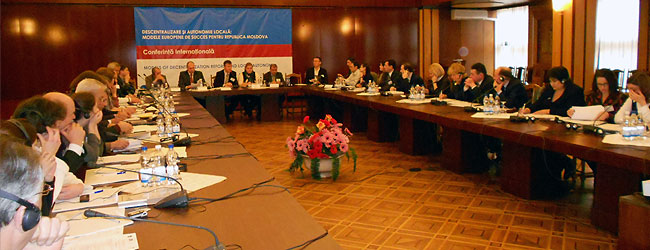|
IN THE SPOTLIGHT |
Eastern Partnership Civil Society Forum
|
|
Moldova: National Decentralisation Strategy
The National Decentralization Strategy (further – Strategy) is the main document of policies in the domain of local public administration, which determines the national mechanisms in the domain of decentralization and assurance of an authentic local autonomy for the local public administration authorities. This Strategy establishes the objectives and tasks on an immediate and average term aiming at implementing the priority of decentralizing the power and assuring the local self-government, in line with the principles of the European Charter of Local Self- Government, which was ratified by the Republic of Moldova on July 16, 1997 and that came for our country into force on February 1, 1998. The concept and policies of the decentralization policy meet the experiences of the European countries and comply with the aspiration for European integration and the bilateral agreements between the Republic of Moldova and the European Union. The elaboration of this Strategy has derived from the need of a strategic planning of the decentralization process aiming at consolidating the capacities of the local public administration authorities and at improving the management and the quality of public services provided to the citizens. While elaborating the Strategy, the existing normative and political frameworks, the achievements and gaps of the previously implemented strategic policies, the exigencies imposed during the process of European integration, the good practice principles connected to the criteria of pre-adherence to the European community and, at the same time, the specific peculiarities of development for the local public administration in the Republic of Moldova were taken into account. Aiming at the integrated coordination of the process of strategic and sector planning in the domains subject to decentralization, the provisions of the Strategy have been correlated with the relevant policies documents, the Reform of the Central Public Administration, and other reforms representing an operational continuity of the actions of the National Development Strategy. In terms of this Strategy, the notions defined under Law nr. 435-XVI of December 28, 2006 regarding the administrative decentralization, the application of which was conditioned by the existence of documents of policies that establish the distinct stages of implementing the administrative decentralization process in the Republic of Moldova, are used and developed. The commitment undertaken by the Government to assure transparency, participate and discuss with all interested parties and the development partners in the elaboration of the Strategy was also performed by the revitalization of the Parity Decentralization Commission, which is the consulting monitoring and coordinating body of the decentralization process and which comprises an equal number of representatives of the governmental and non-governmental sector. The Parity Commission, aiming at accomplishing the above-mentioned objectives, has created decentralization working groups formed of representatives of the central and local administration authorities, the civil society, the scientific and academic environment and the development partners. The approach from the perspective of human rights and gender equality has been a fundamental and integral principle within the elaboration of this Strategy. For this purpose, special attention was paid to the principles of participation, non-discrimination, transparency, accountability and equality between men and women. The elaboration of the Strategy was preceded by the fulfilment of complex studies and analyses in the domain of administrative and financial decentralization, the elaboration of reports regarding the assessment of the capacities of local public administration authorities, the expert reviews of the existing legal frameworks in the domain of organization and activity of the local public administration, which constitutes a wide informational support, available as appendices to this document. During the activity of elaborating this Strategy, the decentralization working groups benefit by specialized methodological assistance granted by the team of international and local experts within the Joint Integrated Local Development Programme, financially supported by the Swedish International Development Cooperation Agency (SIDA), the United Nations Development Programme (UNDP), the United Nations Organization dedicated to Gender Equality and the Empowerment of Women (UN Women) and the Council of Europe (CoE). Download |
Project funded by the European Union
![]()







